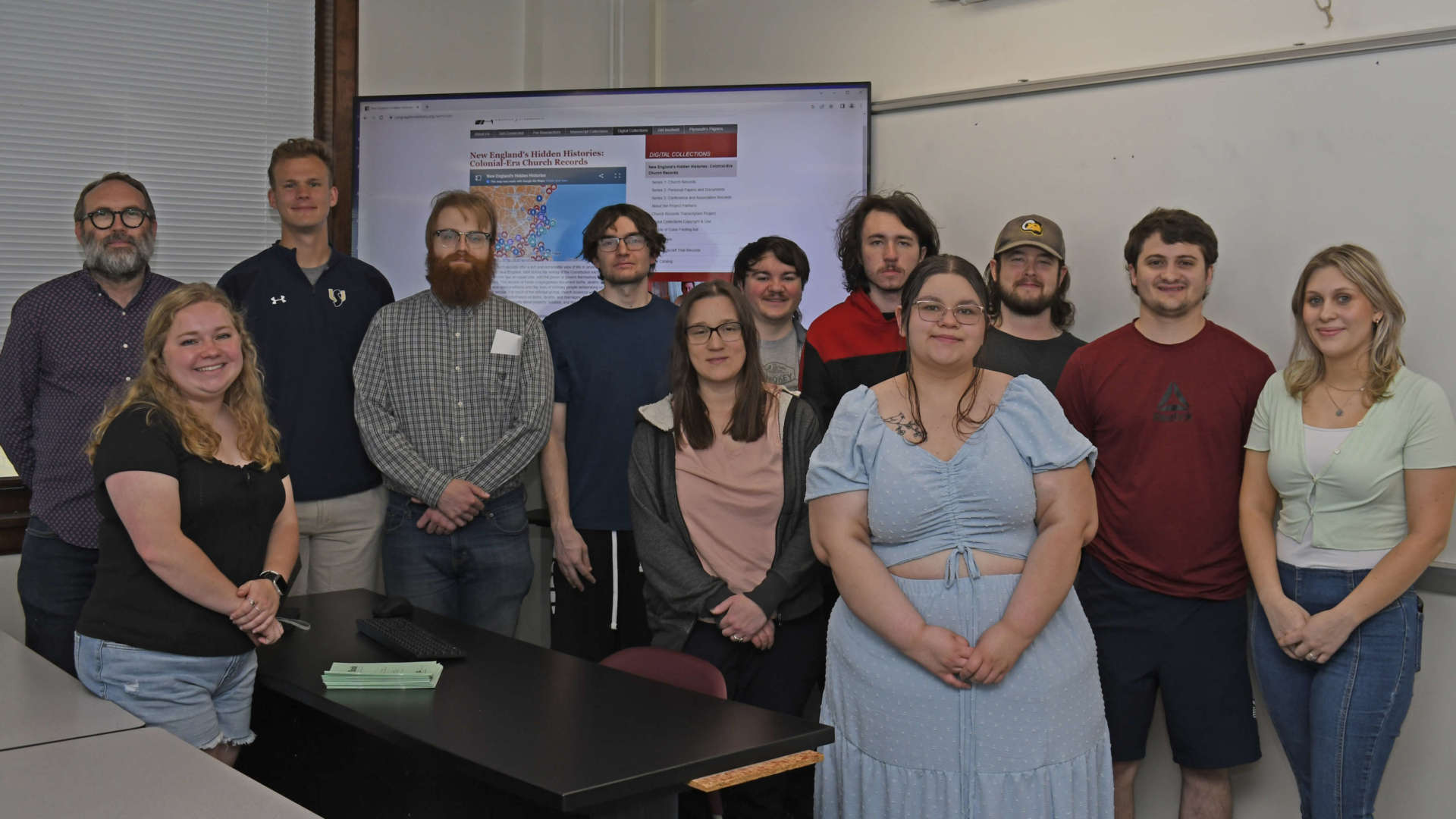ISSUED: 16 May 2023
MEDIA CONTACT: Dana Costa
SHEPHERDSTOWN, WV — Shepherd University students were able to step back in time to the 1600s through the diary of prominent New England minister and writer Cotton Mather.
Dr. Benjamin Bankhurst, associate professor of history, tasked students in the spring 2023 Colonial America class with transcribing pages from a diary written by Mather, who influenced the Salem witch trials that took place from February 1692 to May 1693.
“Cotton Mather was a principle, if not the most important New Englander at the time, and the diary the students transcribed was for the year 1692,” Bankhurst said. “At points, he talks directly about what’s happening in Salem, and you can see his thinking change about it over time. He starts by really wrestling with what’s happening, kind of believing the early accusations, and then slowly, as the trials go on, he comes to the realization that it is perhaps not what he thought it was. The students went on that journey with him through transcription.”
Each student was required to read and transcribe a page from the diary and write a reflection essay describing their experience and what it made them think about the Salem witch trials.
“It is challenging because they wrestled with 17th-century English,” Bankhurst said. “The handwriting is from 350 years ago, and there was not standardization for English, and Mather wrote some in shorthand—something modern-day students aren’t used to.”

Pictured (l. to r.) are Dr. Benjamin Bankhurst, associate professor of history; Emily Cole, history major, Mount Airy, Maryland; Andrew West, secondary education major, Carlisle, Pennsylvania; Paul Butler, history major, Pittsburgh, Pennsylvania; Tyler Carpenter, history major, Williamsport, Maryland; Victorie Asper, secondary education major, Loudoun County, Virginia; Gareth Cushman-Reynolds, history major, Hagerstown, Maryland; Keith Kuntz, secondary education major, Martinsburg, West Virginia; Mariah Ferreira-Perez, history major, Inwood, West Virginia; Shane Allen, history major, Giddings, Texas; Nick Ferony, history major, Bowie, Maryland; and Emma Schnebly, political science major, Clear Springs, Maryland.
A pleasant surprise
“What surprised me is I enjoyed doing it,” said Victoria Asper, a secondary education major from Loudoun County, Virginia. “It was kind of like solving a puzzle. The way it’s written, the lettering doesn’t make sense, and there are Fs in places of Ss, and you have to kind of try and figure out what the characters actually mean.”
“One thing I found interesting was this is a personal journal, and a lot of them are not meant to be read,” said Tyler Carpenter, a history major from Williamsport, Maryland. “This guy was very exuberant and wanted this to be read by multiple people. You were able to see what his thought process was. He talked about an illness plaguing him. It was basically the witches cursed him. It put you in the aspect of a 17th-century preacher, which is what he was.”
Each student transcribed a different page, giving them a different perception of Cotton Mather in both his public and private life.
“What I transcribed was the beginning of a sermon,” Asper said. “He wrote a hymn, and it was basically saying ‘you need to be faithful and grateful and reject the devil because it’s all around us.’ He was very fire and brimstone.”
The pages Nick Ferony, a history major from Bowie, Maryland, and Andrew West, a secondary education major from Carlisle, Pennsylvania, transcribed also centered around Mather’s sermons.
“It seemed like he was taking notes on a sermon he would give and in a lot of it he was promoting a book he had written prior to the witch craze and saying, ‘here look I predicted these things prior to these things happening,’” Ferony said. “It was like Cotton Mather was advertising the book that he had written before.”
“In the part I did, he was looking back on a sermon he had given,” West said. “He was critiquing himself, and he noted what parts of the sermon the congregation understood and reacted to, and then another part he talked about, he didn’t say this, but you could kind of tell he was like, okay, I won’t talk about this again because nobody was paying attention.”
The transcriptions, along with archival-quality photographs of the pages and the students’ byline, will be posted on the Congregational Library & Archives webpage, www.congregationallibrary.org, sometime this summer.
“Our students are unlocking these documents for the computer age,” Bankhurst said. “Documents that would have languished on the shelf of a private library can now be read across the country, indeed across the world, because they [the students] have gone through the effort of transcribing that material, which makes it searchable, which makes it available.”
— 30 —
